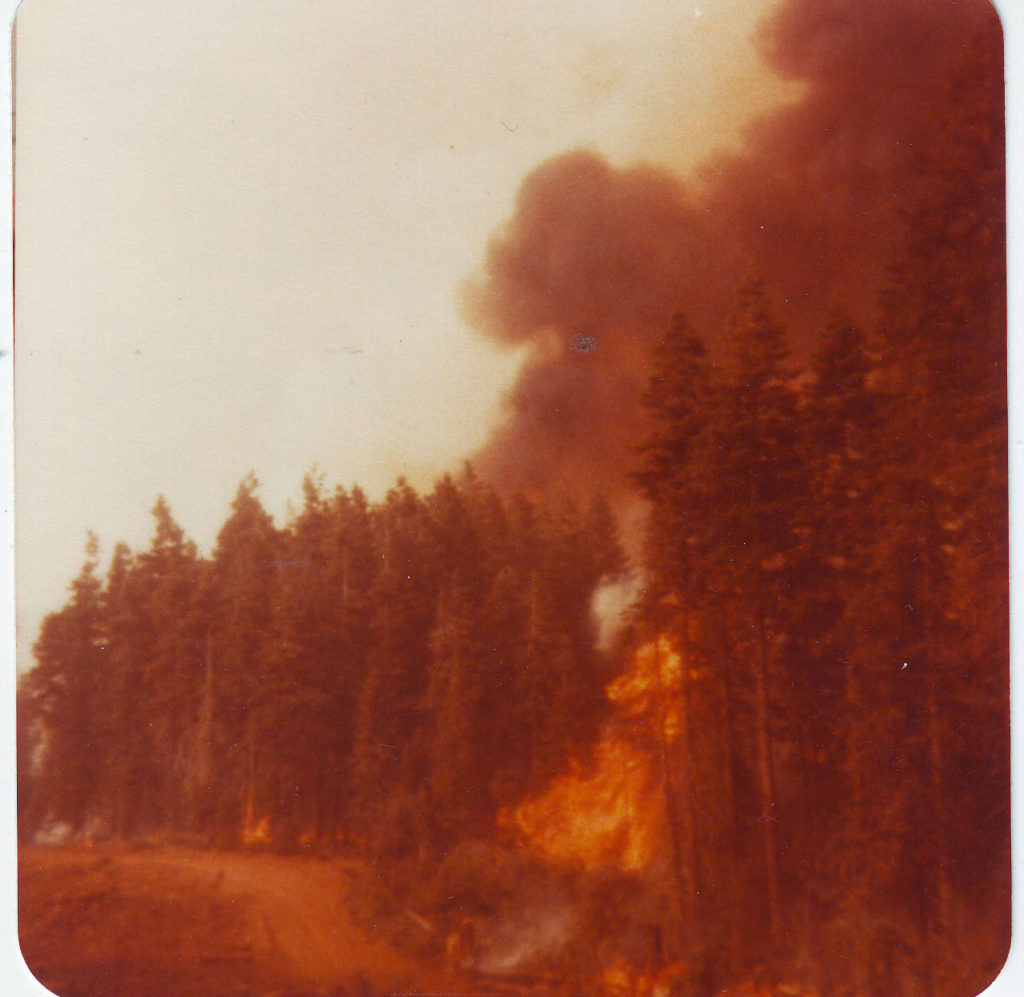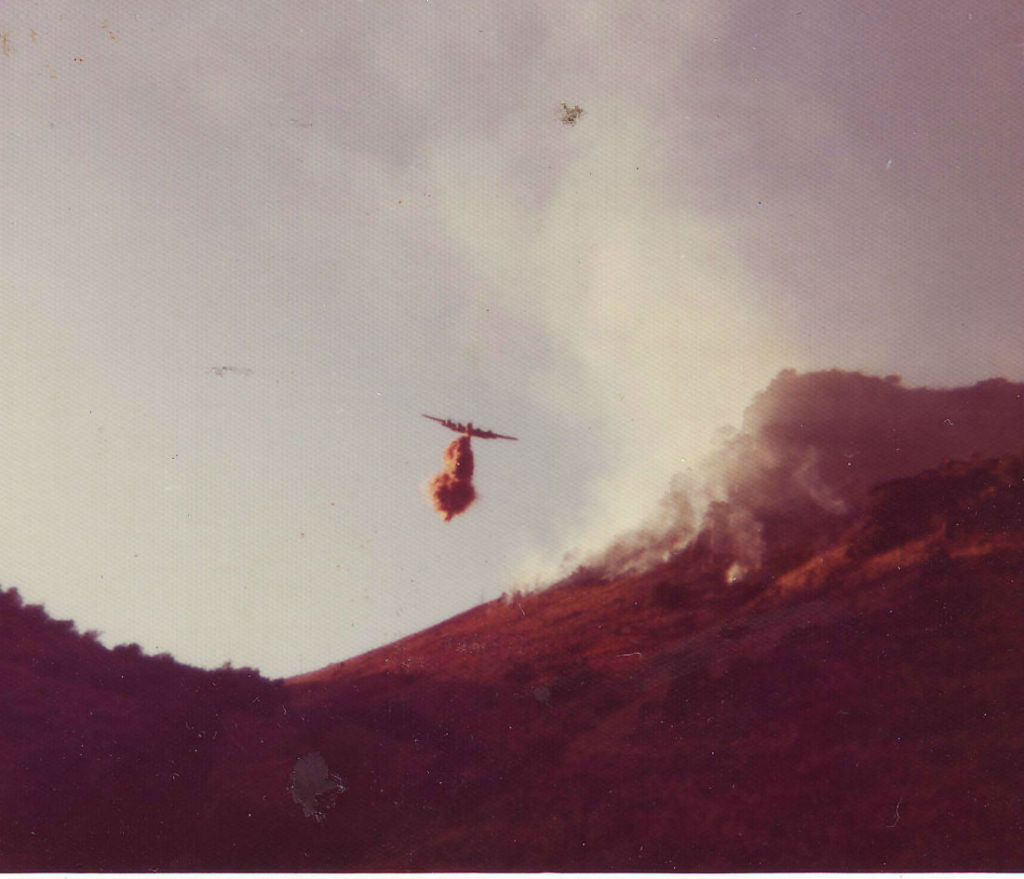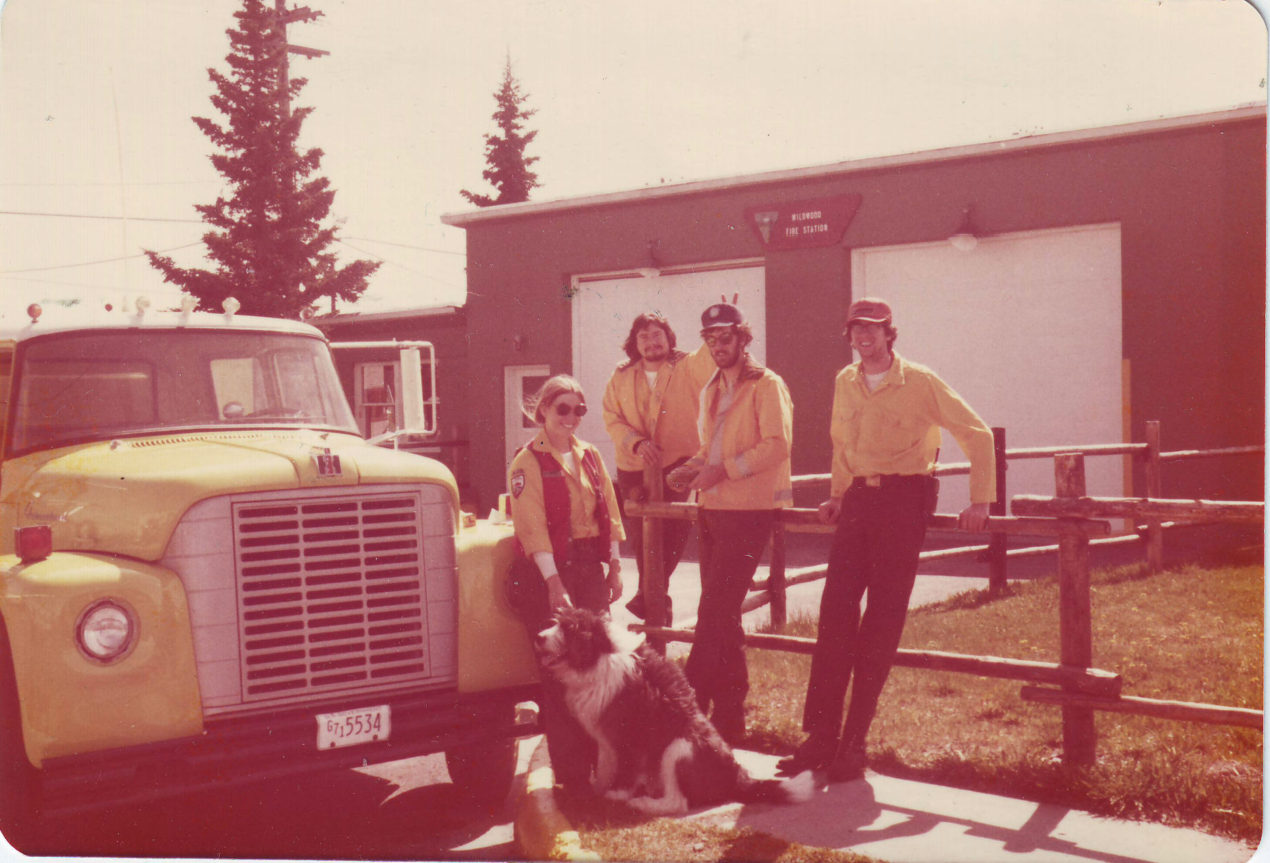Summers of Fire: A Memoir of Adventure, Love and Courage
The following is an excerpt from, “Summers of Fire: A Memoir of Adventure, Love and Courage” by Linda Strader.
“Drop what you’re doing,” Eric said, as he dashed inside and snatched his fire pack off the shelf. “We’ve got a fire!”
I dropped what I was doing.
Eric pressed hard on the gas pedal of the Model 20 tanker, stones ricocheting against wheel wells as we left. From the front seat, I swiveled around to smile at Tom, who gave me a wide grin, his dark eyes sparkling.
“Guess getting stuck with station duty wasn’t so bad after all,” he said.
Once we reached Box Canyon, tight switchbacks and the two hundred gallons of water we carried slowed us down. A rough abandoned mining road got us close, but the fire lapped up a steep, rocky, grass-and-brush-covered hillside, with “inaccessible” written all over it. The tanker would be of no use here.
I buckled my canteen-laden belt around my hips and secured a bandana around my neck. Water stayed attached to my body now, not inside my pack. Difficult terrain, combative plants, and higher-than-usual humidity would make for a tough, sweaty hike. I held my Pulaski at my side, stepping over rocks, maneuvering around prickly cactus and dagger-like agaves hidden by knee-high grass, searching for a route of least resistance. Of which there was none.

At the fire’s edge, we spread out twenty feet apart to build line. My first swing, the Pulaski jerked to an abrupt halt on a rock, my wrists absorbing the shock. Damn! How in the world did plants find a foothold here with no soil? Worse yet, could I stop the fire if I couldn’t dig line?
A distant thunderstorm kicked up gusty winds, sending fire every which way. When the wind pulled a one-eighty, a cascading wave of fire barreled toward us like a high-speed train, flames roaring high above my head.
Eric’s eyes widened. “Into the black! Now!”
I covered more ground in fewer seconds than I ever thought possible, somehow managing to avoid tripping over a rock, an agave, or my own feet, feeling the heat of the fast-moving grass fire. I stumbled, recovered, and ran into the black, where fire had already burned the vegetation, where I should be safe. But the all-encompassing smoke blinded and threatened to choke me. Breaths in shallow gasps, eyes smarting, I took a moment to tie my bandana over my nose and sucked cleaner air through the cloth. Eric coughed, and I recognized his tall silhouette through the wafting smoke. Relieved, I blinked tears from my eyes, rubbing them to improve my vision. But where was Tom? I called out his name, my voice cracking from the panic threatening to close my throat. I strained, listening for his response.
Not too soon I heard, “Here!” accompanied by the sound of boots thumping against rocks. Tom reached my side. “Wow. Was that ever a close call.”
My relief was so profound, I wanted to hug him. Present danger over, we ventured out of our safety zone. My knees quivered from residual fear, my nerves tingly and jumpy. Our fire moved on, finding new fuel and a different course—we’d have to start over. Each swing of the Pulaski moved one rock or one plant closer to a fireline. Each swing hurt my wrists, scorching sun toasted my skin, and sweat burned my eyes. I held back a few frustrated tears. This is so futile! We’ll never catch this. Eric tapped my shoulder and pointed to the sky. A small, fixed-wing aircraft vanished behind a hill.
“That’s the lead plane scoping things out,” he said, shielding his eyes from the glare. “Air tanker should be right behind it.”

Here it came. Maybe slurry would do what we couldn’t. The C-47 swept in low and slow, its belly doors dropping open, spreading a plume of pink across the fire’s main path. Retardant smacked the ground hard, raising a cloud of ashes and splattering droplets for hundreds of yards. On our side of the fire, though, we faced more scraping and more digging out rocks to remove flammable grass.
Eric’s head jerked skyward. “Here comes another drop!”
Heading straight for us, too.. Somebody screwed up! A direct slurry hit could break bones. Or kill. We saw it coming and knew—there was no way could we outrun this.
Eric tossed his Pulaski aside. “Holy shit! Hit the dirt!”
I also pitched my Pulaski so it wouldn’t impale me and dropped face down, wrapping my hands around my hardhat to keep it from getting ripped off. Paralyzed, heart thumping, I braced for impact. Turbines roared overhead. This is it. Splatters hit my back and legs, like a brief summer shower. At a moment when I should have been contemplating death, instead, I thought the slurry smelled sweet, like the Pepto-Bismol it resembled.
About the Writer
Originally from Syracuse, New York, Ms. Strader moved to Prescott, Arizona with her family in 1972. In 1976, she became one of the first women on a U.S. Forest Service fire crew in the Santa Rita Mountains south of Tucson.
“Summers of Fire: A Memoir of Adventure, Love and Courage” was released on May 1st, 2018 by Bedazzled Ink Publishing. In September, she became a finalist in the New Mexico-Arizona Book Awards. She is currently working on a prequel.
In addition to writing, Ms. Strader is a landscape architect, certified arborist, and watercolor artist. She resides in the same area where her Forest Service career began.
Follow Linda’s blog, Facebook and Twitter. You can purchase the book on Amazon US, Amazon UK and Barnes and Noble.


Great words…exciting!